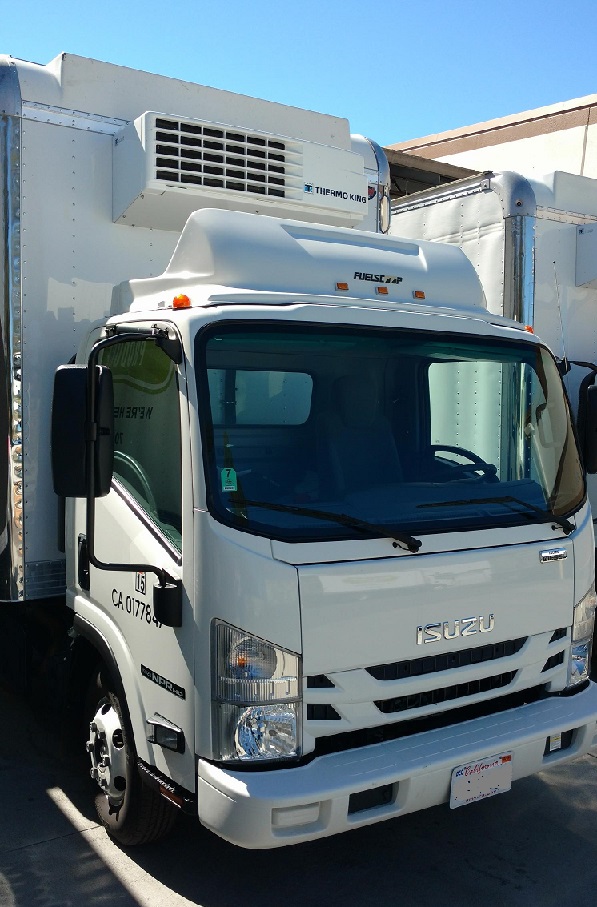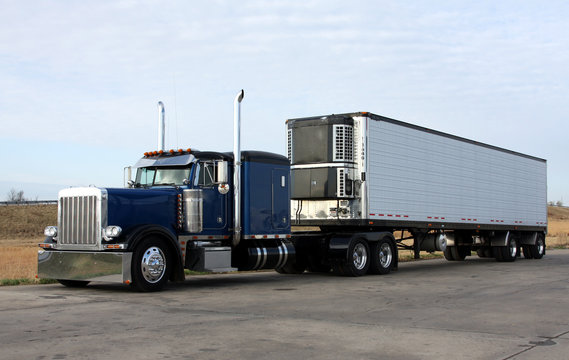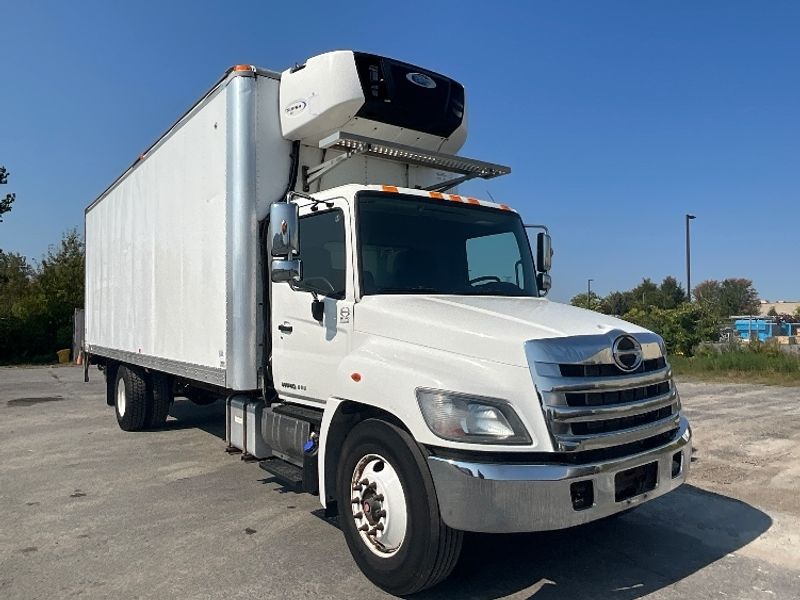Reefer Trucks Thermo King: Relied On for Temperature-Sensitive Goods
Reefer Trucks Thermo King: Relied On for Temperature-Sensitive Goods
Blog Article
Leading Developments in Transport Refrigeration: Enhancing Performance and Security
The landscape of transportation refrigeration is undergoing considerable makeover, driven by developments intended at boosting both efficiency and security. As these advancements proceed to develop, it is necessary to discover their implications on operational methods and governing conformity, prompting a better assessment of how they improve the future of transport refrigeration.
Smart Temperature Keeping An Eye On Equipments
In the world of transport refrigeration, smart temperature tracking systems have actually arised as a critical development for making certain the honesty of temperature-sensitive goods. These advanced systems leverage Internet of Things (IoT) technology to offer real-time data on temperature changes, allowing operators to preserve ideal conditions throughout the supply chain. By continuously tracking the temperature of refrigerated containers and lorries, business can quickly determine variances that may jeopardize product quality.

Additionally, smart surveillance systems often include automated alerts and alerts, allowing stakeholders to react quickly to any kind of possible concerns. This positive method not just minimizes the danger of perishing but likewise boosts compliance with regulatory requirements controling food safety and pharmaceutical transport.
The assimilation of information analytics within these systems also assists in anticipating upkeep, helping operators to anticipate possible tools failures before they occur. This ability minimizes downtime and maximizes functional efficiency, ultimately leading to cost financial savings.
Eco-Friendly Refrigerants
Smart temperature level surveillance systems play a vital function in preserving item top quality, but the efficiency of transport refrigeration likewise hinges on the choice of refrigerants utilized. In contrast, arising options like hydrocarbon-based cooling agents and hydrofluoroolefins (HFOs) existing reduced GWP options, offering both efficiency and sustainability.
These green cooling agents not just minimize environmental impact but also align with global regulations aimed at phasing out damaging compounds. Their adoption can result in improved energy efficiency, ultimately decreasing operating expenses for transport refrigeration systems. The usage of natural refrigerants, such as ammonia and carbon dioxide, has actually gotten traction due to their excellent thermodynamic residential or commercial properties and reduced ecological footprint.
Investing in eco-friendly cooling agents is not simply a regulatory conformity action; it represents a strategic choice that improves brand online reputation and promotes client commitment. refrigerated transportation thermo king. By prioritizing lasting methods, companies can add to a greener future while ensuring the honesty of delivered products
Advanced Insulation Materials
Using sophisticated insulation materials is essential for enhancing transportation refrigeration systems, as they dramatically improve power efficiency and preserve regular temperature control. Conventional insulation methods usually fall brief in stopping thermal transfer, bring about enhanced power consumption and changing temperature levels within refrigerated areas.
Arising materials such as vacuum shielded panels (VIPs) and aerogels offer remarkable thermal resistance, permitting thinner profiles without jeopardizing efficiency. VIPs, as an example, use a vacuum cleaner layer to decrease conductive and convective warm transfer, making them excellent for space-constrained applications. Aerogels, known for their lightweight and permeable framework, supply remarkable insulation while substantially lowering overall system weight.
Furthermore, integrating stage modification products (PCMs) right into insulation systems can better stabilize temperatures during transit. These materials absorb and release thermal energy, efficiently buffering against outside temperature variations.
The combination of these sophisticated insulation materials not only decreases the operational costs connected with energy consumption but also extends the shelf life of temperature-sensitive goods. As the transportation refrigeration sector remains to advance, the fostering of cutting-edge insulation modern technologies will certainly be essential in improving both effectiveness and safety in refrigerated transport.
Automated Path Optimization
The effectiveness of transport refrigeration systems continue reading this is significantly enhanced via automated course optimization, which leverages real-time information and innovative algorithms to figure out the most effective courses for delivery. By evaluating different aspects such as web traffic patterns, climate condition, and distribution home windows, these systems can considerably reduce traveling time and fuel consumption.
Automated course optimization lessens human error and subjective decision-making, which can lead to inadequacies. This innovation enables fleet supervisors to assign sources better, ensuring that cooled goods keep their required temperature level throughout the journey. By maximizing paths, companies can likewise enhance client complete satisfaction via timely distributions.
Furthermore, automated systems can adjust to unexpected conditions, such as road closures or abrupt traffic spikes, enabling for dynamic rerouting. This versatility not just protects the stability of temperature-sensitive items but additionally contributes to general functional efficiency.
Carrying out automated course optimization can result in considerable price savings while minimizing the carbon impact connected with transport. As businesses progressively focus on sustainability, this technology stands apart as a crucial component in contemporary transportation refrigeration, straightening operational goals with environmental obligation. Inevitably, automated course optimization represents a significant improvement in the pursuit for effectiveness and safety and security in transportation refrigeration.

Real-Time Information Analytics
Automated path optimization considerably benefits from the combination of real-time data analytics, which offers essential insights right into the efficiency of transportation refrigeration systems. By making use of real-time data, transport operators can keep track of temperature level changes and equipment performance, ensuring that perishable items are maintained within called for specifications throughout transportation. This positive strategy not only boosts the high quality of the transported items yet likewise minimizes the danger of perishing and loss.

In enhancement to improving efficiency, real-time analytics boosts security by guaranteeing compliance with governing requirements for temperature control. This not just safeguards public health however also strengthens a business's credibility - thermo king truck refrigeration units. As the transportation refrigeration market evolves, the combination of real-time data analytics arises as a cornerstone for driving technology, sustainability, and operational quality
Conclusion
To conclude, the improvements in transport refrigeration dramatically enhance look these up both effectiveness and safety within the sector. Smart temperature tracking systems and real-time data analytics offer important oversight, while green cooling agents and advanced insulation materials add to sustainability and power effectiveness. Automated route optimization algorithms find out here not just reduce travel time however additionally decrease environmental effect. Jointly, these innovations represent an important advancement in transport refrigeration, guaranteeing conformity with governing criteria and advertising a greener future.
The landscape of transportation refrigeration is undertaking substantial makeover, driven by technologies intended at boosting both performance and security.Smart temperature level tracking systems play an essential duty in keeping item high quality, however the efficiency of transport refrigeration also pivots on the selection of cooling agents utilized. Their adoption can lead to enhanced power performance, eventually decreasing operating costs for transport refrigeration systems. Inevitably, automated path optimization represents a significant advancement in the pursuit for effectiveness and security in transport refrigeration.
In verdict, the improvements in transport refrigeration significantly boost both performance and safety within the sector.
Report this page